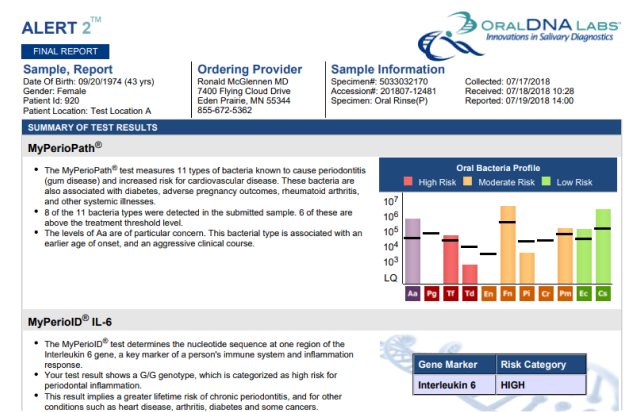
While the exact cause of rheumatoid arthritis is not known, recent studies have suggested that the oral microbiome may play a role. Research has shown that patients with RA have a different oral microbiome than those without the disease. Specifically, there appears to be a higher prevalence of certain bacteria in the oral microbiome of RA patients, including Porphyromonas gingivalis, Aggregatibacter actinomycetemcomitans, and Prevotella intermedia.
These bacteria are known to cause periodontitis, a chronic inflammatory disease that affects the tissues supporting the teeth. The inflammation caused by periodontitis may contribute to the development of RA, as it can trigger an immune response that leads to the destruction of joint tissue.


Porphyromonas gingivalis is a Gram-negative anaerobic bacterium that is commonly associated with periodontal disease, which is a severe form of gum disease, which is characterized by inflammation destruction of gum tissue, and eventual loss of teeth if left untreated.
P. gingivalis is a rod-shaped bacterium that forms biofilms, which are complex communities of bacteria that adhere to surfaces, including teeth and gum tissue. This bacterium has the ability to evade the immune system and can produce a variety of virulence factors that contribute to its pathogenicity. Some of the virulence factors produced by P. gingivalis include enzymes that degrade gum tissue, toxins that damage host cells, and molecules that modulate the host immune response.
Research has shown that P. gingivalis is not only associated with oral health problems but also has been implicated in systemic health issues. Studies have suggested that P. gingivalis may be involved in the development of various systemic conditions, including cardiovascular disease due to its ability to enter the bloodstream from the oral cavity and spread to other parts of the body.
In particular, P. gingivalis has been linked to an increased risk of cardiovascular disease by promoting inflammation, contributing to the formation of atherosclerotic plaques (fatty deposits) in arteries, and interfering with blood clotting mechanisms. Additionally, P. gingivalis has been found in atherosclerotic plaques in arteries, indicating a potential role in the development and progression of cardiovascular disease.


Aggregatibacter actinomycetemcomitans, formerly known as Actinobacillus actinomycetemcomitans, is a Gram-negative, facultatively anaerobic bacterium that is commonly associated with periodontal disease, which is a severe form of gum disease. A. actinomycetemcomitans is a key bacterial species involved in the initiation and progression of periodontal disease, and it has been extensively studied for its pathogenic properties.
A. actinomycetemcomitans has several virulence factors that enable its pathogenicity, including its ability to adhere to tooth surfaces and form biofilms, produce various enzymes that damage host tissues, evade host immune responses, and induce inflammation. It can also produce toxins that can cause direct damage to host cells and contribute to the destruction of gum tissue.
Several studies have found that A. actinomycetemcomitans is more prevalent in the oral cavity of individuals with RA compared to those without RA. It has been hypothesized that A. actinomycetemcomitans and other periodontal bacteria may trigger or exacerbate an immune response in the oral cavity, leading to the release of pro-inflammatory cytokines and other inflammatory mediators. These inflammatory substances can then enter the bloodstream and potentially contribute to the development or progression of RA in susceptible individuals.
Furthermore, A. actinomycetemcomitans and other periodontal bacteria have been found in synovial fluid and joint tissues of RA patients, suggesting a possible direct involvement of these bacteria in the joint inflammation and damage seen in RA. Some studies have also suggested that A. actinomycetemcomitans may induce production of autoantibodies against citrullinated proteins, which are known to be involved in the pathogenesis of RA.


Prevotella intermedia is a Gram-negative, anaerobic bacterium that is commonly associated with periodontal disease, which is a severe form of gum disease. P. intermedia is one of the many bacterial species that can contribute to the development and progression of periodontal disease, and it has been extensively studied for its role in oral health and disease.
P. intermedia has several virulence factors that contribute to its pathogenicity, including its ability to form biofilms, produce enzymes that damage host tissues, evade host immune responses, and induce inflammation. It can also produce toxins that can cause direct damage to host cells and contribute to the destruction of gum tissue.
The exact mechanism of how P. intermedia may be related to rheumatoid arthritis is not yet fully understood, but several hypotheses have been proposed. One hypothesis is that P. intermedia and other periodontal bacteria can initiate or exacerbate an immune response in the oral cavity, leading to the release of pro-inflammatory cytokines and other inflammatory mediators. These inflammatory substances can then enter the bloodstream and potentially trigger an autoimmune response, leading to the development or worsening of RA in susceptible individuals.
Research has shown that treating periodontitis in RA patients can lead to improvements in their disease activity. This suggests that there may be a link between the oral microbiome and the pathogenesis of RA.
The theory is that the harmful bacteria in the mouth can travel through the bloodstream to the joints, where they can cause inflammation and contribute to the development of rheumatoid arthritis. In fact, some studies have found that treating gum disease can improve the symptoms of rheumatoid arthritis.


At Dentulu, we offer salivary testing for the oral microbiome, which can help identify any imbalances in the oral microbiome and allow our dentists to develop a personalized treatment plan. By maintaining good oral hygiene and addressing any imbalances in the oral microbiome, we can help our patients reduce their risk of developing rheumatoid arthritis and other inflammatory diseases.

Generally, a salivary testing report will include the patient's identifying factors such as age, name, gender, and the date of the test. Next it will identify the testing results which could include inflammatory markers, oxidative stress markers, and genetic markers. Finally it will include a section on interpreting your results.
At Dentulu, we highly recommend each patient to schedule an appointment with their general dentist or primary care physician, or one of our highly trained Dentulu Teledentists who can discuss with you and assess your current dental and health conditions as well as prior health history to come up with the most appropriate care plan for your needs.
See Sample Report

It’s simple! Click the link below, choose the package you'd like, follow the prompts, and have the kit delivered right to your door!
Once your test results come in, you can interpret the results yourself, follow up with your regular dentist, or schedule a consultation with one of our Dentulu Teledentists from your computer or mobile device at any time that is convenient for you!
 Interpreting Your Test Results
Interpreting Your Test Results